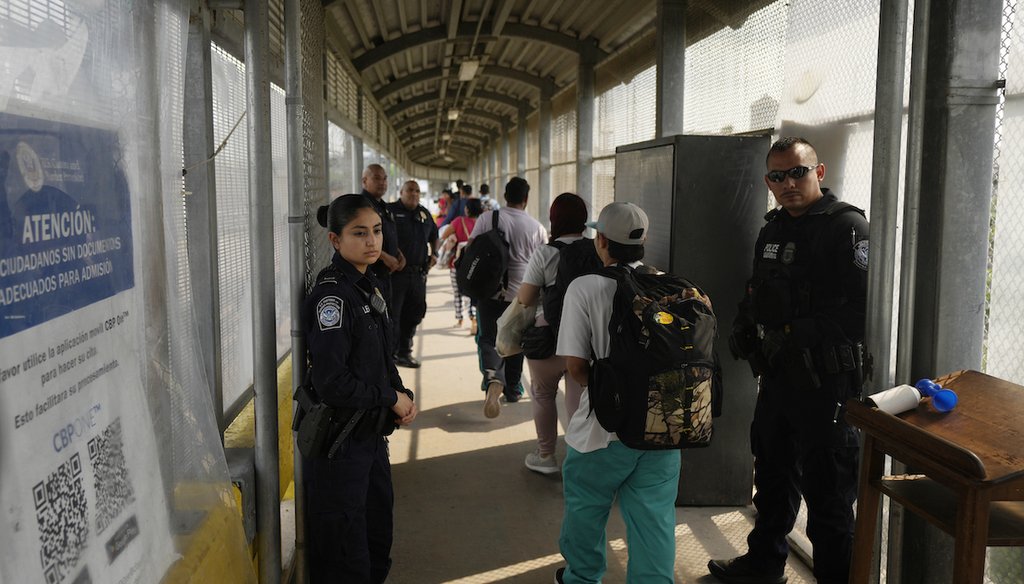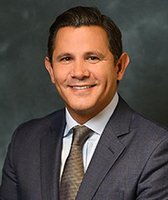Stand up for the facts!
Our only agenda is to publish the truth so you can be an informed participant in democracy.
We need your help.
I would like to contribute

U.S. Customs and Border Protection Police monitor as migrants walk across the Puerto Nuevo bridge from Matamoros, Mexico, May 12, 2023. (AP)
If Your Time is short
Finding accurate information online about applying for asylum at the U.S. southern border can be challenging. Many social media posts offer conflicting and confusing information.
U.S. officials suspect that many more migrants will arrive at the border now that Title 42 has expired; the public health policy limited people’s ability to apply for asylum for three years, since the COVID-19 pandemic’s onset in March 2020.
A man in a TikTok video posted May 10 says that although there will be "immediate deportations" without Title 42, "it’s not all bad news for immigrants."
"The U.S. will extend humanitarian parole to more countries. Humanitarian parole already exists for Venezuela, Haiti, Cuba, Ukraine and Nicaragua," the man in the video said. "Colombia, Guatemala, Honduras and El Salvador will be added to this."
He said the U.S. government will be granting 30,000 monthly visas to people from those additional countries, "so they can come to the U.S. for two years with work permits."
The TikTok account, soyfbo, has more than 100,000 followers, and this video has more than 500,000 views. However, the video is incorrect; it refers to two different parole programs, and neither will start accepting citizens from Colombia, Guatemala, Honduras or El Salvador.
In April 2022, in response to Russia’s invasion of Ukraine, the U.S. started the Uniting for Ukraine program to give people fleeing the war a safe path to enter the U.S. This move came after many Ukrainians began traveling to the southern border in search of asylum.
In January 2023, the U.S. began accepting 30,000 people, collectively, from Venezuela, Haiti, Cuba and Nicaragua.
Both humanitarian parole programs allow people to live and work in the U.S. for two years. To qualify, migrants need a sponsor in the U.S. People allowed in through these programs are not coming in with visas, as the video claims. It’s unclear what the beneficiaries’ status will be after the two-year period.
In April, President Joe Biden’s administration announced new programs that will admit relatives of U.S. citizens and legal permanent residents. These programs will benefit people from El Salvador, Guatemala, Honduras and Colombia. However, these have not yet been implemented, and the family reunification process differs from the humanitarian parole programs.
The Department of Homeland Security plans to provide more information about these new programs in June.
"These processes, once finalized, will allow vetted individuals with already approved family-based petitions to be paroled into the United States, on a case-by-case basis," DHS said in a fact sheet. People paroled into the U.S. under these programs will be eligible for work permits.
On May 2, the White House said the U.S. plans to accept up to 100,000 people from Honduras, Guatemala and El Salvador under the family reunification process. The White House did not specify over what time frame that would occur.
The U.S. already has family reunification programs for Cubans and Haitians.
In these cases, a family member who is a U.S. citizen or legal permanent resident can apply for a family member’s parole if that person has no other way to legally enter the U.S.
People granted parole can live in the U.S. and seek a work permit and eventually apply for legal permanent residency.
This process circumvents the family reunification visa process, which can take 20 years or more.
Our Sources
PolitiFact, Title 42 expiration: What's next for migrants applying for asylum at US’ southern border?, May 8, 2023
U.S. Citizenship and Immigration Services, Uniting for Ukraine, accessed May 19, 2023
U.S. Citizenship and Immigration Services, Processes for Cubans, Haitians, Nicaraguans, and Venezuelans, accessed May 19, 2023
Department of Homeland Security, Fact Sheet: U.S. Government Announces Sweeping New Actions to Manage Regional Migration, April 27, 2023
White House, Mexico and United States Strengthen Joint Humanitarian Plan on Migration, May 2, 2023
U.S. Citizenship and Immigration Services, The Cuban Family Reunification Parole Program, accessed May 19, 2023
U.S. Citizenship and Immigration Services, The Haitian Family Reunification Parole (HFRP) Program, accessed May 19, 2023
Email exchange, Department of Homeland Security, May 18, 2023












































